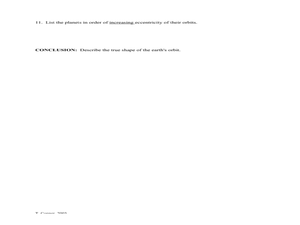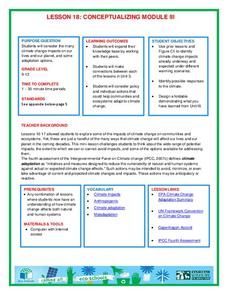Curated OER
WebQuest Solar System Colonization Project 2000
Sixth graders complete a WebQuest to study the names and locations of the planets in the solar system. They investigate the causes of the seasons and the distance between the planets using astronomical units. They use technology to...
Curated OER
Where the Past and Present Meet
In this planets worksheet, students are given clues from Greek mythology to find the names of planets and moons. They use an on line source to find the answers.
NASA
Dark Matter NASA Conference
Young scholars calculate the escape velocity of planets in our solar system and use that knowledge to calculate the escape velocity for NGC 2300 group. They then suggest reasons for the escape velocity to be higher than possible given...
PHET
Planetary Magnetism
What do magnetic fields look like? The best way to learn about magnetic fields is to try identifying them for yourself. Scholars will understand the importance of magnetic fields after completing this experiment. The extension activities...
Curated OER
Planetary Tourism
Students pretend they are the first student to be allowed in space. They examine all nine planets on their journey. They complete a KWL chart and worksheets before they do their research. They create an itinerary of their tour and...
Curated OER
Colonizing the Stars
Middle schoolers compare and contrast the size, composition and surface features of the nine planets of our solar system with the possible sizes and compositions of extra -solar planets.
Curated OER
Voyage to Titan
Learners go to the linked web page "The Nine Planets" to find facts about Titan. They list elements of the solar system and the five planets of the outer solar system. Students find their weight on each planet. Titan is selected from the...
Curated OER
Mars Colonization Assignment #1
Eighth graders recognize the some day humans may wish to colonize Mars. They participate in an Internet adventure where they compare and contrast Earth to the other nine planets in the solar system.
Curated OER
Solar System: Fantasy Planet
Learners create their own fantasy planet using computer software on KidPix. In this planets lesson plan, students also write a paragraph about their planet including the name, population, weather, and more.
Curated OER
The Planets
For this planets worksheet, students read a one page text about the planets. Students read details and facts about each planet. Students answer 12 questions about the text.
Curated OER
Our Solar System
In this solar system worksheet, students complete a database comparing the 9 different planets' mass, surface temperature, rotation period, orbital period, moons, and distinguishing features. This worksheet is a graphic organizer.
Curated OER
The Solar System
In this solar system worksheet, students determine the correct unit of measurement to use when measuring a list of items. Students list the five outer planets and four inner planets. This worksheet has 20 fill in the blank questions.
Curated OER
Life on Other Planets
For this planets worksheet, students put the planets in order, complete sentences about planets, read text about planets, match sentences, and more. Students complete 7 tasks total.
Curated OER
Puzzling Planets
Students list the order of the planets, describe the general characteristics of each planet and explain why we could not live on other planets without special equipment.
Curated OER
WEAVING TECHNOLOGY INTO THEMATIC UNITS
Fourth graders explore the planets by researching and writing a report about one of the nine planets.
Laboratory for Atmospheric and Space Physics
Looking to the Future
New Horizons set forth on a mission to Pluto in 2006. Ten years later, the spacecraft is still on its way. Here, enthusiastic scholars predict what they will be like—likes, dislikes, hobbies, etc.—when New Horizons arrives at its...
Curated OER
Ellipse Lab
Leading the students to draw a representation of ellipses of planets, this handout will help understanding the planet movement around the sun. There are ten questions about the analysis of those orbits and a conclusino specifically...
Curated OER
Order of Operations
Some terrific practice in solving math equations that have a specific order of operations component built into them. Some of the problems have parentheses, and all four operations are present in the problems. Pupils solve 50 problems and...
National Wildlife Federation
Conceptualizing Module III
Many researchers focus on one impact of climate change in isolation, but researchers gain a global perspective when they come together. A timely lesson teaches scholars about the projected impacts of global temperature increases. Then...
NOAA
Methane Hydrates – What's the Big Deal?
Have you ever tried to light ice on fire? With methane hydrate, you can do exactly that. The ice forms with methane inside so it looks like ice, but is able to burn. The lesson plan uses group research and a hands-on activity to help...
UNICEF
Get Real on Climate
Climate change isn't just about a warming planet; it will affect humans' health, spread of disease, changes in heat waves and droughts, and changes in storms and wildfires. Participants explore global climate change through discussions...
Curated OER
Ordinal Numbers Are Out of This World
First graders identify and write ordinal numbers by following the sequence the school bus followed during a field trip to the nine planets in the solar system. This is based on the book The Magic School Bus Lost in the Solar System.
Curated OER
Our Solar System
Third graders describe the composition of our solar system. They recognize the names of the planets in our solar system and compare and contrast the nine planets that orbit the sun.
Curated OER
Large Numbers- the Planets
In this writing distances instructional activity, students re-write the chart to show the distance each planet sits from the sun using words rather than numbers, all measurements are in km.

























